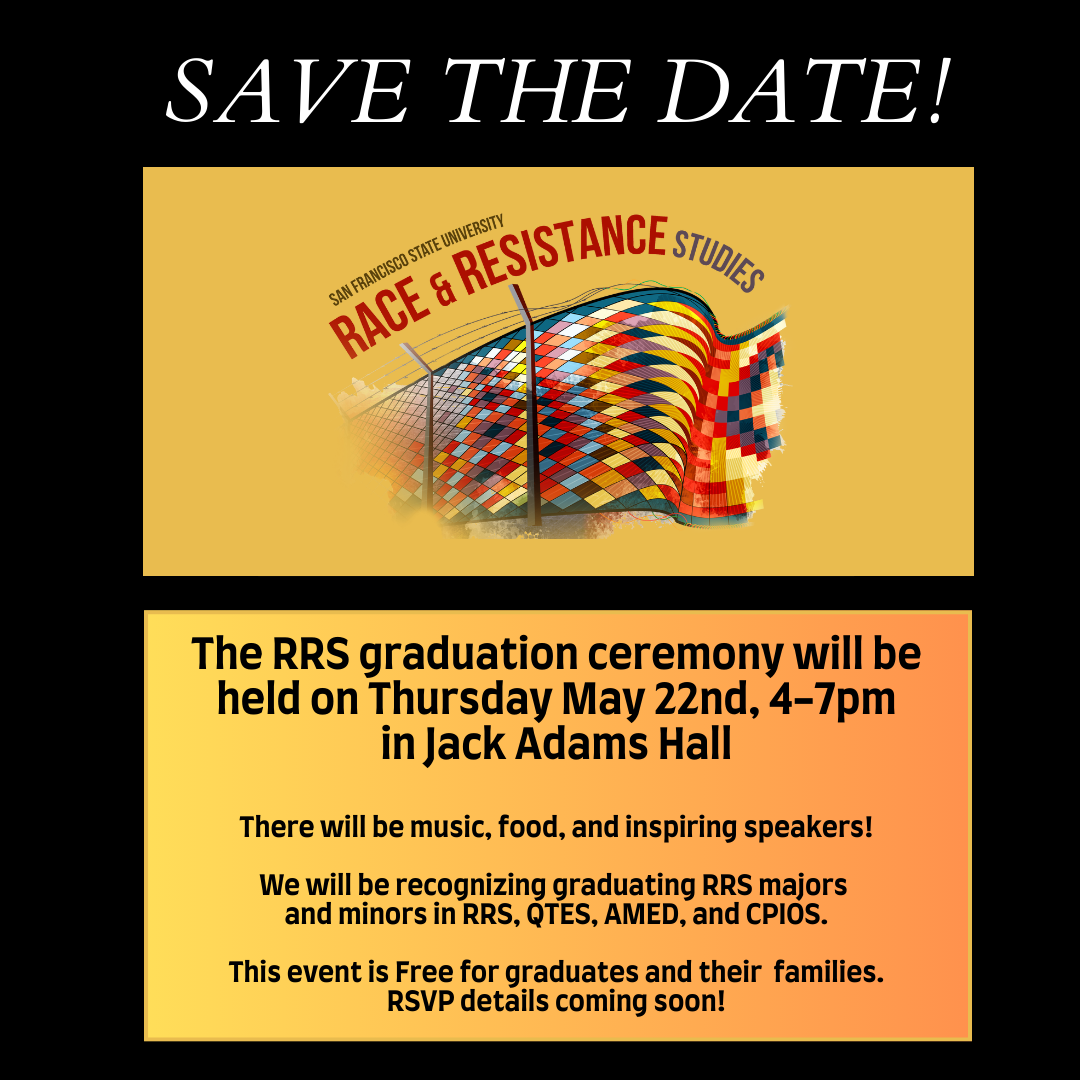
Message from the Chair
Welcome to the 4th edition of our newsletter! In this issue, we continue to celebrate our incredible students, staff, and faculty. We also have exciting news to share, including information about past and upcoming events — including graduation!
We are in challenging times, as many of you know. We remain committed to supporting our students and collaborating with the College of Ethnic Studies to ensure that our students, staff, and faculty are safe, that our students continue to receive a liberatory education, and that we uphold academic freedom.
We’ve included some resources in this newsletter (also available on our website) that we encourage you to read and share.
Thank you for being a part of our community!
If you have any events you’d like to see, please reach out to me (bakrania@sfsu.edu) or to our Office Coordinator, Gautam Baksi (gautam@sfsu.edu).
If you'd like to donate to RRS to help us support our students, please donate through our online platform. Thank you!
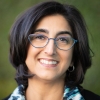
Dr. Falu Bakrania
Spotlights
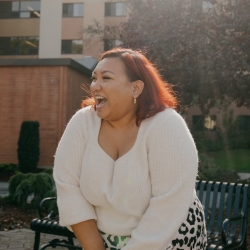
Staff Spotlight
Ty Maniulit
KAmusta! My name is Ty Maniulit, and I am the Assistant to the Associate Dean at the College of Ethnic Studies, and an alumna with a B.A. in Asian American Studies and Liberal Studies. Born and raised on Tongva Land, also known as Echo Park, California, I am the daughter of a strong, resilient Kapampangan immigrant mother, Librada Maniulit.
Growing up, I faced challenges in school and didn't finish high school on time. College felt out of reach until I attended my friends' Filipin@ graduation at SFSU. Being surrounded by so many graduates who looked like me was a real eye-opener — it was the first time I saw college as something I could achieve. That experience inspired me to apply to SFSU, where I initially thought I would major in Social Work.
However, everything changed when I took my first Asian American Studies course — AA S 352 Filipina/o American Literature, Art, and Culture with Dr. Allyson Tintiangco-Cubales. It was there that I discovered my true passion for Ethnic Studies. During my time at SFSU, I joined Pin@y Educational Partnerships (PEP), where I taught Ethnic Studies with a focus on Filipina/o American History to elementary and high school students. PEP was not only my home away from home but also a community that showed me new meanings of love — love for myself, my family, and my community. PEP transformed the way I viewed the world and is a community I will always hold sacred and close to my heart.
Now, as a staff member at the College of Ethnic Studies, I feel truly honored to work alongside the incredible professors who helped shape my critical lens and foster my growth and purpose. In my role, I strive to create a welcoming space where everyone feels seen, valued, and celebrated. I'm dedicated to collaborating with faculty, staff, and students to nurture our community and create opportunities for joy, growth, and resistance.
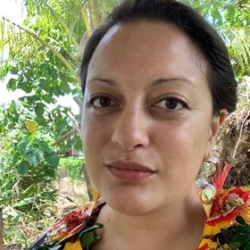
Faculty Spotlight
Leora Kava
I was born and raised in Sacramento, California by my mother who built community around me, hustled to create as many opportunities as possible for me to grow, and who taught me the power and responsibility of the word — both in speaking and in writing. My mother was my first teacher and first editor, and I carry both her care and sharpness with me, even as this year (2025) marks 15 years since her passing. It was through her that I was connected to and cared for by many different and loving communities. She made it possible for me to learn and practice music, persevere in school, and get connected to my father’s side of my family — my Tongan family and community — as a kid growing up in South Sac. So many patterns of my life now were started with the insistence and persistence of my mother, and I always want to start any story about me by starting with deep respect and love for her. I miss her, and she is still teaching me today.
It is through the love and care of my families and communities in South Sac and Elk Grove that I was supported to succeed in school and feel that I could see education as a critical site of struggle for accurate narratives, self-determination, and organizing. My elders are all teachers, nurses, caretakers, and organizers. It was through their love and support that I was given time and space learn about and connect to my Tongan roots. My father is from Kolomotuʻa, Tonga, and I was able to connect with my Tongan family in Sacramento by playing rugby and being folded into Pacific Islander organizing for our own cultural spaces like language classes, dance and community events. It was through our families coming together to organize for our own space that I was exposed to Tongan cultural values, histories, and ways of caring for one another so far from our ancestral islands.
With the support and love from my communities in Sacramento, I did well in school and ended up doing my undergrad in Providence, Rhode Island at Brown University. It was through spaces and programs at the Third World Center (now the Brown Center for Students of Color) that I was politically educated by fellow students around issues of imperialism, racism, heterosexism, ableism, and Islamophobia in ways that were relevant to our everyday lives as students of color navigating not only the university, but our own communities back home. I was cared for and educated by professors in the East Asian Studies and Africana Studies departments who deepened my understanding of structures of power, oppression, and the strategies of resistance that come from our communities.
What was missing in my undergraduate experience was the community and understanding of Pacific Islanders — none of my classes came close to mentioning, let alone studying, the histories and knowledge systems that I had been exposed to in Sacramento from my own Pacific Islander community. I never saw us, and I needed us. For my senior project, I chose to shift my focus to understanding the erasure of Pacific Islanders, and organized a series of events through the Third World Center to bring Pacific Islander narratives to my campus. I am so grateful to have been able to connect with Dr. Fuifuilupe Niumeitolu and Kumu Kawika Alfiche, who came to my campus to share their experiences and knowledges as Pacific Islander teachers and community organizers. It was through Dr. Niumeitolu that I first heard the work of Epeli Hauʻofa — Tongan scholar and activist, whose words changed the course of my life. It was Dr. Niumeitolu and Epeli Hauʻofa words that encouraged me to do graduate work at the Center for Pacific Islands Studies at the University of Hawai’i at Mānoa.
I had the great privilege of completing my Masters and Ph.D. in Hawaiʻi, where I was surrounded by Pacific Islander teachers, students, and communities who were deeply dedicated to defining education on our own terms as Islanders. I was held by and educated by aloha ʻāina whose fierce resistance to U.S. imperialism and strategies of resurgence I carry with me every day. I was held by my Tongan family living in Hawaiʻi throughout my journey through graduate school, and their love and direction are a key reason for my perseverance through my programs. I graduated with my Ph.D. in English, focusing on Pacific Islander literature, Indigenous epistemologies, and decolonial creative writing pedagogies. I graduated from my programs with people who are my chosen family, and I have brought their lessons and relationships with me to my work at SFSU. Kū kiaʻi mauna. Wansolwara. Papua Merdeka.
I am so deeply grateful to have the opportunity to apply the training and knowledge I’ve received from my communities — from Sacramento to Tonga to Providence to Hawaiʻi — to serve as one of the faculty members of the Critical Pacific Islands and Oceania Studies (CPIOS) minor program at SFSU, housed in the Department of Race and Resistance Studies. This program was fought for and is sustained by student organizing, deep solidarity work between staff and faculty, and the continuing love and support of our communities in the Bay Area. Our work is built on the decades-long work of our Pacific Islander communities to create academic programs that reflect, examine, and apply our community’s deep histories. My work as an artist, teacher, and organizer is dedicated to the continuance of the spaces our communities need to struggle, heal, organize, love, and steadfastly determine our just and liberated futures. Mālo e ʻofa, mālō e ngāue lahi. ʻOfa lahi atu.
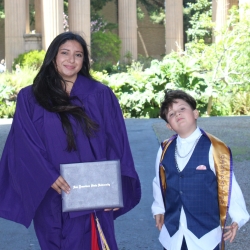
Undergraduate Alumni Spotlight
Ariel Peraza
Ariel Peraza’s journey into Ethnic Studies began when they took their first Ethnic Studies class at Cuesta Community College. For the first time, they saw themselves and their people reflected in education. This experience led them to earn an Associate’s degree in Social Justice before transferring to San Francisco State University, where they majored in Race and Resistance Studies. They are now pursuing a Master’s in Ethnic Studies with a focus on critical legal theory and Indigenous feminism.
As a youth mentor at Tso HO fa Horse Corp, Ariel uses horsemanship as a tool for educational liberation. Through working with horses, young people learn about self-determination, reconnect with ancestral knowledge, and develop a deeper relationship with the land. Ariel’s greatest achievement is being the first in their family to pursue higher education while raising their child as a single parent. Balancing school and parenting has been challenging, but they refuse to let the stigma of young motherhood deter them from fighting for justice and redistributing power to their communities.
Ariel credits their family, community, and the activists who ensure collective survival for their success. They also honor the professors who created inclusive spaces where they never felt unwelcome for bringing their child to class. Ariel’s work is rooted in the belief that future generations should never have to question their place in education or society.
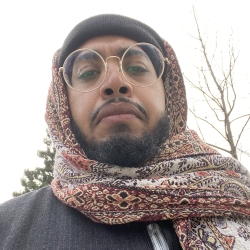
Graduate Alumni Spotlight
Ossama Kamel
Ossama graduated from SFSU with an M.A. in Ethnic Studies. Ossama is an Afro-Arab, multi-disciplinary artist and community organizer raised in South Sacramento. He has a strong passion for rescuing beautiful cultural furniture and art from the clutches of boho chic minimalists on the internet.
Ossama’s day job is dedicated to grappling with the tensions of organizing against cruel and oppressive systems in the United States. In service of this, Ossama works with organizations and autonomous formations on the left with the hope of aligning and cohering our intellectual and infrastructural resources, materializing radical liberatory frameworks and principles, and building alternatives that address material conditions.
Ossama believes that we have a duty to translate our theories into plans and models that prove to our communities that our imaginations and dreams can be actualized through sustainable models for a just and liberated world.
Ossama says he chose San Francisco State University, for two reason: (1) The historical significance of SFSU in the liberation struggle makes this institution a necessary site of continued power, investment, and community control, and (2) the establishment of the Arab and Muslim Ethnicities and Diaspora Studies program (AMED) at the university reflects a powerfully rooted and urgent center for the study of empire’s warfare against Black and Brown bodies, both within its occupied territories and across the world.
His thesis, titled “The Non-Profit Industry is Failing the People's Hopes and Demands for Liberation,” was an opportunity to research and document some of the deep wounds within the non-profit sector — a sector that he believes too casually positions itself as the voice of marginalized peoples while also relying entirely on the legitimacy and permission from the state to achieve wins and secure victories for the community.
He believes that by experimenting internally with our organizational models and externally with our programming we could build alternatives that threaten State control over our lands, labor, bodies, and psyches.
Ossama hopes to continue his graduate education journey in fields related to decolonial studies.
For those interested in checking out his poetry and reading his rants on food, organizing, and politics, and/or if you want links to art and furniture that he doesn’t have room for in his home, you can reach him on Instagram at @kamelo.o.
Resources
With the current social and political climate, the RRS department has compiled a couple of resources in the case you encounter I.C.E.
Announcements
Faculty News
Dr. Leora Kava and Levalasi Loi On received a $750,000 grant from the Mellon Foundation, “Building Critical Pacific Islands & Oceania Studies at SFSU.”
Dr. Ponipate Rokolekutu co-edited a special issue of the Okinawa Journal of Island Studies (OJIS) titled “Our Sharpest Tools: Unsettling Empire from Islands and Oceans.” and published: “Interrogating British Colonial Benevolence and the Annexation of the Fijian Islands” (Nov 2024)
Dr. Omar Zahzah’s book, Terms of Servitude: Zionism, Silicon Valley, and Digital/Settler-Colonialism in the Palestinian Liberation Struggle, is being co-published by The Censored Press and Seven Stories Press and is available for pre-order!
Dr. Zahzah also just published an article in Volume 9, Issue 1 of Critical Ethnic Studies, themed "Palestine After Analogy" co-edited by Nasser Abourahme and Iyko Day. His article is titled, "Love is Older than 'Israel:' The Solidarity Poetics of aja monet and Mohammed El-Kurd."
Dr. Falu Bakrania is part of a team — with Leila Malikyar (lecturer in RRS), Leslie Quintanilla (faculty in WGS), and Ikaika Glasberg (faculty in SOC/SXS) — that won a $96k Mellon Foundation Grant to Advance and Expand Ethnic Studies by strengthening student understanding of intersectionality between Ethnic Studies and Women’s Studies, Gender and Sexuality Studies and Trans Studies.
Omar Zahzah and Leora Kava are 2 of the 5 faculty at SFSU to have received a faculty/undergraduate research grant (FURG) to work with an undergraduate student on a project that brings together Ethnic Studies with Gender and Sexuality and Trans Studies.
Student News
Each year, the RRS department offers several scholarships. They are the RRS Scholarship, the Undergraduate Queer Ethnic Studies Scholarship, and the Edward Said Scholarship. All of the information can be found on the Scholarships page.
The due date (March 25, 2025) is coming up soon! Please apply.
Past Events
On March 13, 2025, RRS co-sponsored a panel discussion, “Decolonizing Our Diets: Food and Culture as Resilience and Resistance,” which featured four award winning chefs. Organized and moderated by RRS lecturer and climate justice activist, Gopal Dayaneni, the panel featured Reem Assil (award-winning Palestinian-Syrian chef and author based in Oakland), Bryant Terry (award-winning African American vegan chef, food justice activist, and author), Samin Nosrat (award-winning Iranian-American chef and author of the #1 NYT best seller, Salt, Fat, Acid, Heat), and Crystal Wahpepah (an Indigenous food warrior, restaurant owner, and author).
The dynamic discussion focused on the number of ways in which food and food culture is a form of resilience and resistance amongst oppressed peoples. The chefs discussed how food has been a form of resistance against colonization, enslavement, capitalism, war, and genocide. They reflected on how they have woven the political histories of their own communities into their work as chefs and public intellectuals.
During the Q and A, students asked insightful questions about how they could incorporate food justice into their own lives. The event was recorded; we will let you know when it becomes available!
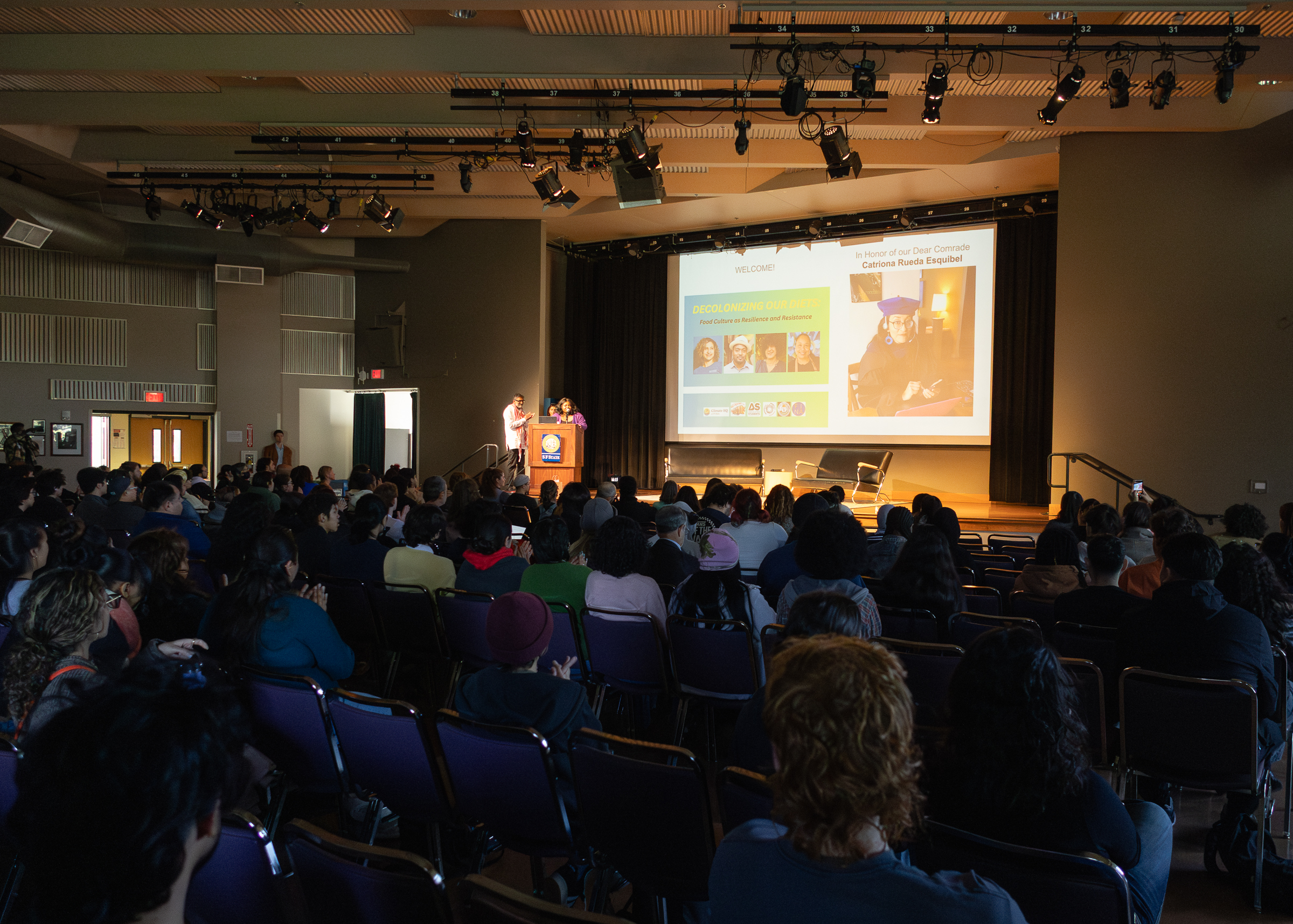
On November 12, 2024, RRS faculty hosted Liz Oliva Fernández, the award-winning Afrocuban journalist & filmmaker who is well known for her work through Belly of the Beast Cuba. She was joined by Ed Agustin, an international journalist that has written for The Guardian, The New York Times, and Drop Site News.
The event was well attended by SFSU students, staff, alumni, retired faculty, and community members. The audience came to learn more about socialism in Cuba and the gains of the revolution, particularly in regards to race, gender, and sexuality — all of which was welcomed given the outcomes of US elections in the week prior to the event.
Fernández provided insights on life growing up in Cuba, and the negative impact of the US blockade of the Cuban economy, which was compounded by the COVID pandemic, and by Biden’s continuation of the first Trump administration’s escalation of sanctions on Cuba. Furthermore, she screened clips of her award-winning documentaries to demonstrate the small number of conservative Cuban-American legislators that support the US blockade of Cuba. This includes the then US Senator, Marco Rubio, who was announced as the Trump administration’s nominee for the Secretary of State on the same morning of this event. As such, Fernández shared her assessment of Rubio’s appointment and the challenges that posed for Cuba’s right to self-determination. Finally, she concluded by sharing the positive perceptions of Cuba held by working-class African-Americans in Washington, D.C., and by sharing Cuba’s support for the self-determination of Palestine, specifically by providing free medical education to future doctors from Gaza who attend Cuba’s Latin American School of Medicine (ELAM).
Ed Agustin led the second half of the event by sharing his assessment, as a visitor to Cuba, of the positive developments accomplished by socialist development, including the lack of student debt for all Cubans that earn a college degree, as well as the accomplishments of the Cuban healthcare system (which sends doctors to serve the most remote and underserved communities around the world, often free of charge). He also shared frank criticisms about political speech in Cuba. Most importantly, however, he shared concluding remarks about the dire, yet seemingly indirect, impact of US sanctions, which create food insecurity, medical austerity, and effectively constitute a form of collective punishment that harms, even kills, the most vulnerable in Cuban society.
When the event concluded, attendees enjoyed brief moments speaking in person with Fernández and Agustin.
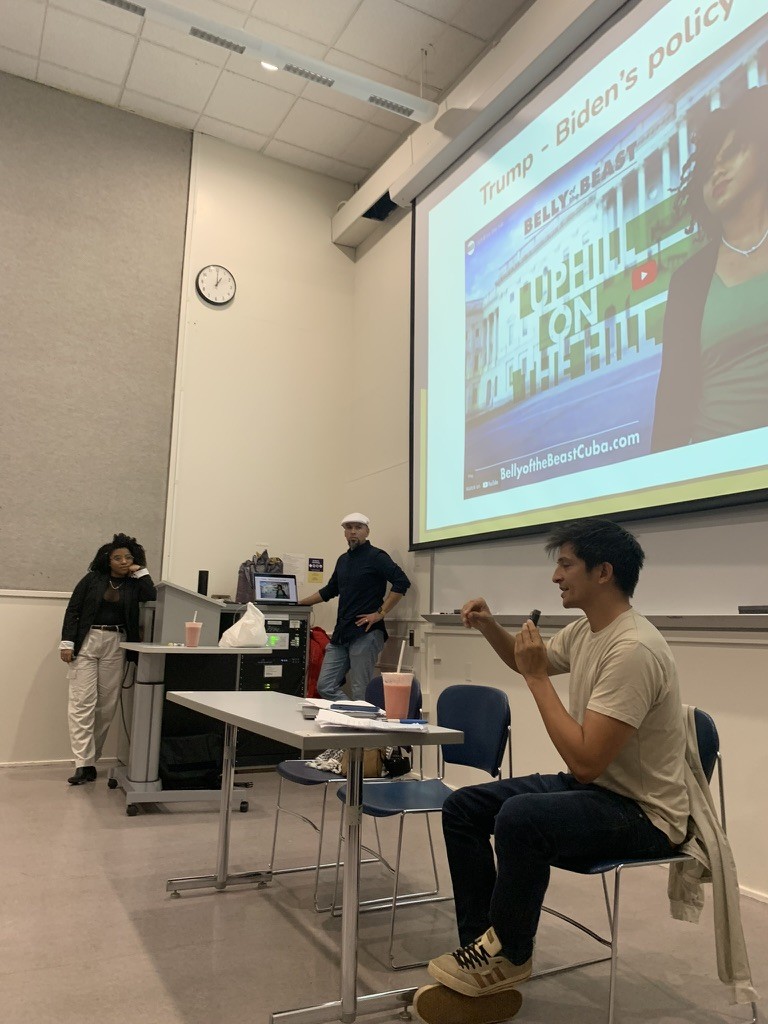
Upcoming Events
This Sunday (3/23), Dr. Zahzah will be speaking at Medicine for Nightmares bookstore in San Francisco. He is part of a line-up that includes Dr. Nicholas Mirzoeff from NYU and the Center for Convivial Research and Autonomy. They will be discussing Nicholas's new book, To See in the Dark: Palestine and Visual Activism Since October 7th as well as Dr. Zahzah's forthcoming book Terms of Servitude: Zionism, Silicon Valley and Digital Settler Colonialism in the Palestinian Liberation Struggle.
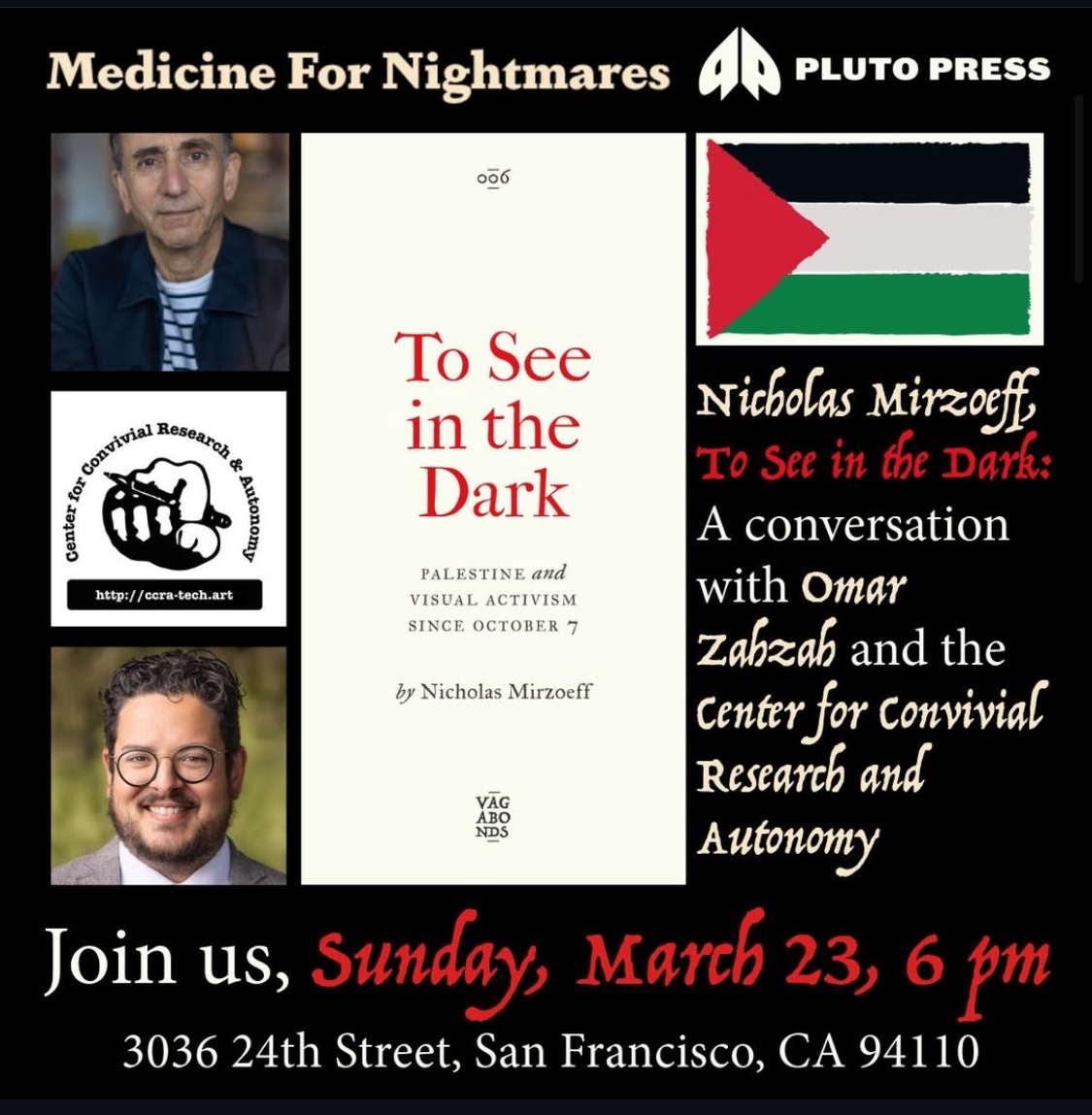
This year’s graduation will be held on May 22nd from 4 – 6 p.m. in Jack Adams Hall. We will have food, music, and most importantly, speeches from students, including our honorees! Stay tuned for more information.
